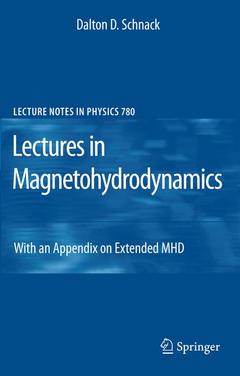Description
Lectures in Magnetohydrodynamics, 2009
With an Appendix on Extended MHD
Lecture Notes in Physics Series, Vol. 780
Author: Schnack Dalton D.
Language: English
Subjects for Lectures in Magnetohydrodynamics:
Approximative price 84.39 €
In Print (Delivery period: 15 days).
Add to cart
Lectures in Magnetohydrodynamics
Publication date: 03-2012
323 p. · 15.5x23.5 cm · Paperback
Publication date: 03-2012
323 p. · 15.5x23.5 cm · Paperback
Approximative price 84.39 €
Subject to availability at the publisher.
Add to cart
Lectures in magnetohydrodynamics (hardback): with an appendix on extended mhd book (series: lecture notes in physics) POD
Publication date: 08-2009
Support: Print on demand
Publication date: 08-2009
Support: Print on demand
Description
/li>Contents
/li>Comment
/li>
Magnetohydrodynamics, or MHD, is a theoretical way of describing the statics and dynamics of electrically conducting uids. The most important of these uids occurring in both nature and the laboratory are ionized gases, called plasmas. These have the simultaneous properties of conducting electricity and being electrically charge neutral on almost all length scales. The study of these gases is called plasma physics. MHD is the poor cousin of plasma physics. It is the simplest theory of plasma dynamics. In most introductory courses, it is usually afforded a short chapter or lecture at most: Alfven ? waves, the kink mode, and that is it. (Now, on to Landau damping!) In advanced plasma courses, such as those dealing with waves or kinetic theory, it is given an even more cursory treatment, a brief mention on the way to things more profound and interesting. (It is just MHD! Besides, real plasma phy- cists do kinetic theory!) Nonetheless, MHD is an indispensable tool in all applications of plasma physics.
Review of Scalars, Vectors, Tensors, and Dyads.- Mass Conservation and the Equation of Continuity.- The Equation of Motion.- Energy Flow.- The Electromagnetic Field.- Closures.- Conservation Laws.- Ideal MHD and the Frozen Flux Theorem.- Resistivity and Viscosity.- Similarity Scaling.- The W#x00F6;ltjer Invariants of Ideal MHD, Topological Invariance, Magnetic and Cross-Helicity.- Reduced MHD.- Equilibrium: General Considerations#x2014; The Virial Theorem.- Simple MHD Equilibria.- Poloidal Beta, Paramagnetism, and Diamagnetism.- #x201C;Force-Free#x201D; Fields.- Toroidal Equilibrium; The Grad#x2013;Shafranov Equation.- Behavior of Small Displacements in Ideal MHD.- Linearized Equations and the Ideal MHD Force Operator.- Boundary Conditions for Linearized Ideal MHD.- Proof that the Ideal MHD Force Operator is Self-Adjoint.- Waves in a Uniform Medium: Special Cases.- Waves in a Uniform Medium: Arbitrary Angle of Propagation.- The Calculus of Variations and the Ideal MHD Energy Principle.- Examples of the Application of the Energy Principle.- The Rayleigh#x2013;Ritz Technique for Estimating Eigenvalues.- The Gravitational Interchange Mode or -Mode.- Comments on the Energy Principle and the Minimizing Eigenfunction.- Examples of the Application of the Energy Principle to Cylindrical Equilibria.- A Very Brief and General Tour of Suydam Analysis for Localized Interchange Instabilities.- Magnetic Reconnection.- Steady Reconnection: The Sweet#x2013;Parker Problem.- Resistive Instabilities: The Tearing Mode.- Resistive Instabilities: Closing Remarks.- Turbulence.- MHD Relaxation: Magnetic Self-Organization.- Dynamos: Magnetic Field Generation and Maintenance.
The combined length and style of the thirty-eight lectures in this concise primer are appropriate for complete presentation in a single semester and make it the only self-contained advanced graduate text in the field
Includes supplementary material: sn.pub/extras
© 2024 LAVOISIER S.A.S.




